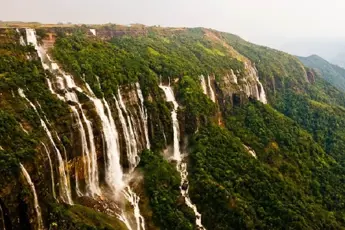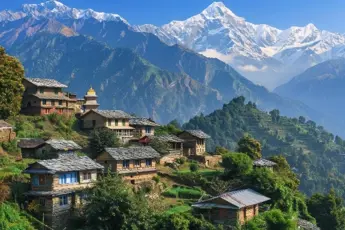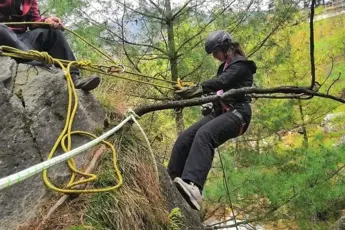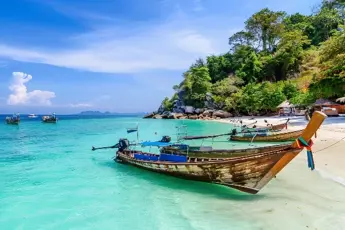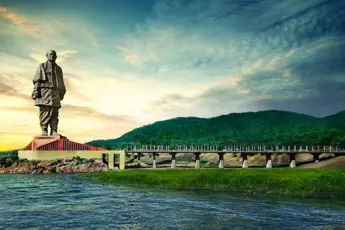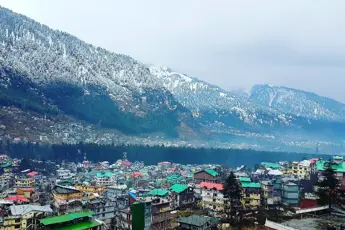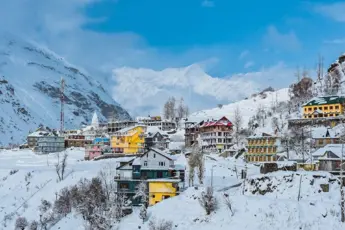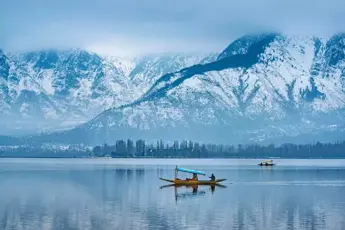airport
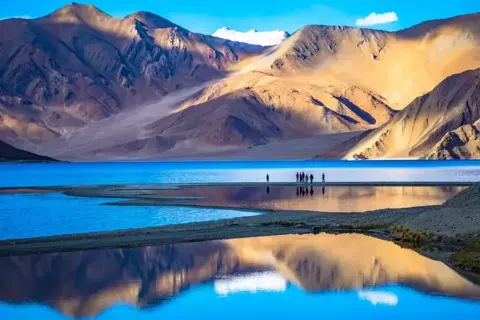
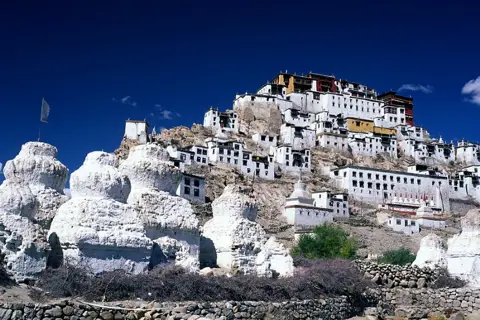
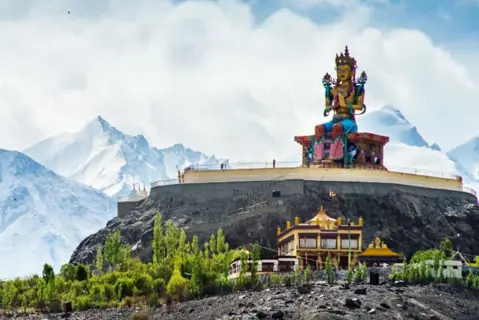
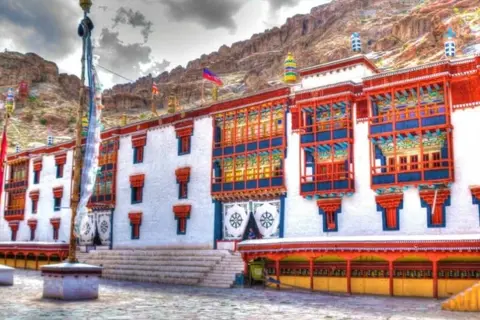
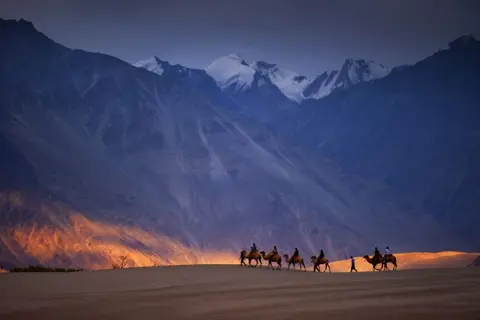
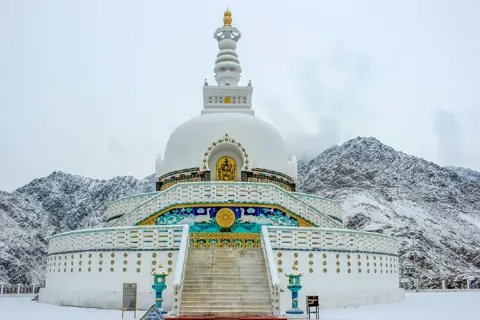
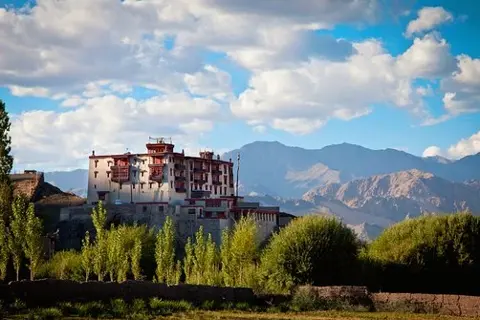
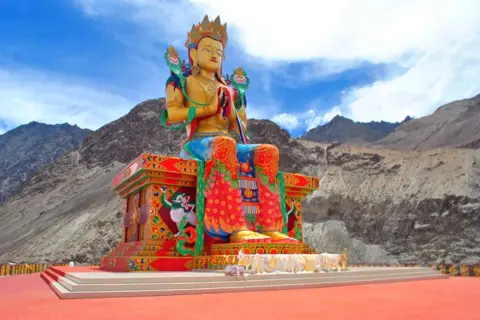
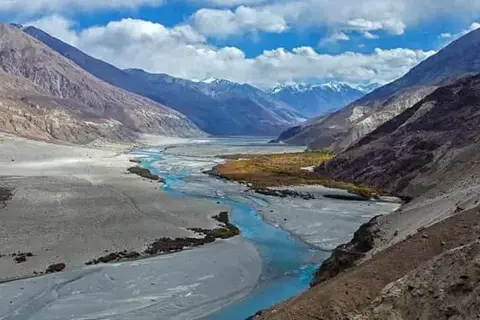
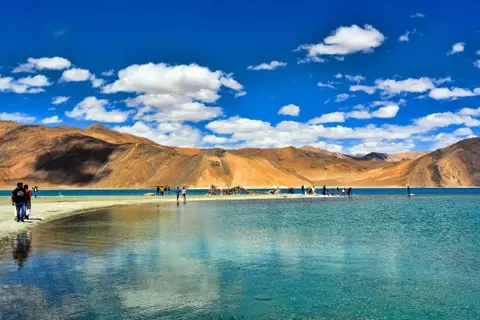
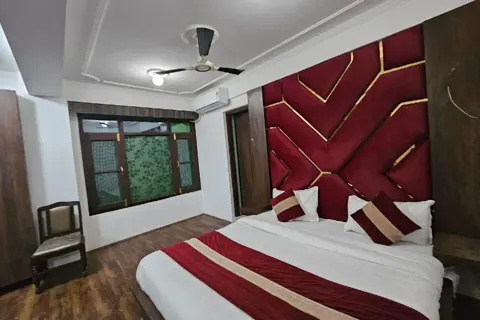
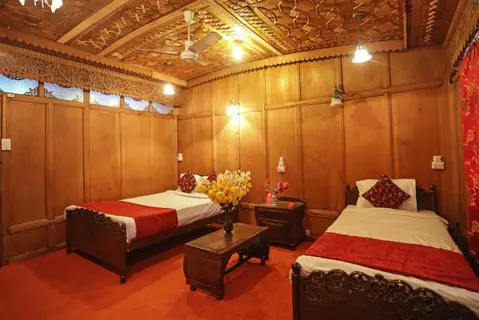



Images


Images
Leh Ladakh Tour Packages
Starting from INR 27141
Per Person
( Inclusive of all taxes )
Meal
Permit
Guide
Tea Snacks
Transport
Room Stay
Meal
Permit
Guide
Tea Snacks
Transport
Room Stay
Leh Ladakh Tour Packages: Highlights
Experience the mesmerizing beauty of Leh Ladakh with our specially curated tour packages for adventure enthusiasts.Explore serene monasteries, rugged landscapes, and crystal-clear lakes in Leh Ladakh on an unforgettable journey.Enjoy thrilling activities like trekking, biking, and river rafting while discovering the charm of Leh Ladakh.Witness the breathtaking views of Pangong Lake and Nubra Valley with our tailor-made Leh Ladakh tour plans.Embark on a soul-stirring adventure across the majestic Himalayan region with our premium Ladakh packages.Discover the unique culture, vibrant festivals, and delicious cuisine of Leh Ladakh during your dream vacation.Make lasting memories as you travel through the iconic passes and scenic routes of Leh Ladakh with expert guides.
Leh Ladakh Tour Packages: Overview
Activity location: Leh, Ladakh.Trip Duration: 5 Days | 4 NightsMax. Altitude: 11,500 Ft.Best Time to Visit: June to March.Accommodation: Stay at a 3* Hotel.About Leh Ladakh Tour PackagesNestled in the majestic Himalayas, Leh Ladakh is a dream destination for nature lovers, adventure enthusiasts, and spiritual seekers alike. Our Leh Ladakh tour packages are carefully crafted to provide a perfect blend of thrill, serenity, and culture. Whether you’re planning a Leh Ladakh bike trip, a romantic honeymoon package, or a relaxing family tour, we offer customizable itineraries that suit all your travel needs. Explore iconic spots like Pangong Lake, Nubra Valley, and Khardung La Pass while enjoying hassle-free travel arrangements.Our Leh Ladakh packages, jeep safari tours, and biking trips are ideal for those looking for an unforgettable adventure. With affordable prices, our Leh Ladakh tour packages from Delhi, Mumbai, Bangalore, and other cities make it convenient to start your journey from anywhere. If you're visiting during winter, experience the frozen beauty of Chadar Trek, or opt for summer tour packages to witness the vibrant landscapes in full bloom. Discover our Leh Ladakh group tour packages or enjoy a luxurious retreat with our Leh Ladakh honeymoon packages with airfare. From the pristine beauty of monasteries to the thrill of mountain passes, our packages ensure a well-rounded experience. Book your dream trip now and create lifelong memories in the magical land of Leh Ladakh! Plan your getaway with our Manali Tour Package and enjoy snow-capped mountains and thrilling adventures.Trending Packages: Meghalaya Tour | Nepal Tour | Manali Tour | Andaman Tour | Gujarat Tour | Shimla Tour | Kashmir Tour
Inclusion and Exclusion
This Package Includes:TransportationWelcome drink on arrivalBreakfast & dinnerPermission ChargesMealsPickup and Drip from AirportAll taxesLeh inner line permitVisit Leh's Famous Sightseeing AreasAccommodationExcludes:Everyday LunchHorse/pony/camel etc ridingMedical health insuresAll domestic & international flight tickets(Laundry services, Travel insurance)Garden, Monument, & Museum entry tickets
Tour Plan
Leh Arrival & Monasteries Tour
Welcome to Leh!On arrival at Leh airport, our driver/tour guide will pick you up.Proceed directly to the pre-booked hotel in Leh.Freshen up, take the room keys, and rest for a while.Later, embark on your first day tour of Leh city, visiting some famous tourist spots:Shey PalaceHemis MonasteriesStok PalaceThiksey MonasteryHall of Fame
Nubra Valley Day
Morning after breakfast in the hotel , we will check out and leave For Nubra. On the way we will come across the famous & highest road way known as KHARDUNGLA PASS.After reaching Nubra we will pay visit to famous spots in Nubra like. (HUNDER VILLAGE, DESKIT MONASTERY)Double-Humped Bacterian Camel safari In (Sand Dunes Between Hundar & Deskit VIllages).After enjoying full day Nubra tour we will drive back to hotel in Nubra. Overnight stay in hotel Nubra.
Nubra to Pangong: Lake View
The journey from Nubra Valley to Pangong Lake can be taken either by road or air.The road distance between Nubra Valley and Pangong Lake is approximately 221 km.The Shyok route (about 140 km) is the shorter and faster option, taking around 6 hours, and avoids the need to return to Leh.En route, visit the Shyok River and Shyok Monastery.Upon reaching Pangong, visit the famous Pangong Lake, known for its stunning beauty.After a full day of exploration, return to your camp in Pangong for an overnight stay.
Pangong to Leh: City Exploration
After breakfast in Pangong, we will proceed towards Leh.The road trip from Leh to Pangong Lake covers approximately 160 km and takes about 5-6 hours, depending on road conditions and weather.The route offers stunning views of the surrounding landscapes and mountains, making the journey a memorable experience.The most popular route to reach Pangong Lake from Leh is via the Chang La Pass.It’s advisable to start early in the morning to have enough time to explore Pangong Lake and return to Leh before nightfall.Upon reaching Leh, visit some famous spots such as:Shanti StupaLeh Main Bazar/Main MarketOvernight stay at the hotel in Leh.
Farewell Leh: Airport Departure
Today after breakfast in the Hotel, proceed towards Leh Airport for onward destination with smiling memories.
Package Variant Options
Leh Ladakh Tour Packages without Transportation
Pickup Points
Dropping Points
Airport
Things To Carry
Clothing:Thermal wear (top and bottom)Fleece jacket or woollen sweaterWarm gloves and socksWoollen cap and sun hatFootwear:Comfortable sandals or flip-flops (for evenings)Extra pair of socksAccessories:Sunglasses (UV protection)Sunscreen lotion and lip balm (SPF 30+)Trekking polesBackpack (50-55 liters) and rain coverRaincoatHeadlamp or flashlight with extra batteriesPersonal Items:Toiletries (toothbrush, toothpaste, soap, towel, etc.)Personal medication and first-aid kitWater bottle or hydration packHigh-energy snacks (nuts, energy bars, etc.)Others:Camera and extra batteriesMobile phone and power bankLightweight sleeping bag (optional)Plastic bags or waterproof bags for storing wet clothesIdentification documents Pack wisely to ensure a comfortable and enjoyable trekking experience.
Starting from INR 27141
Per Person
( Inclusive of all taxes )
Enquiry Form
Why escape2explore
done Verified Google Reviews 5000+ Reviews on the google platform.done 500+ Tours and Activities We have activities across every category so that you never miss best things to do anywhere.done Customer Delight We are always able to support you so that you have a hassle free experience.
Related Packages
Frequently Asked Questions
Q1: What are the must-visit places covered in the Leh Ladakh tour package?
The package includes top attractions such as Pangong Lake, Nubra Valley, Magnetic Hill, Leh Palace, Shanti Stupa, Khardung La, and Tso Moriri Lake. Depending on the itinerary, you may also visit Lamayuru Monastery, Zanskar Valley, and the confluence of the Indus and Zanskar rivers.
Q2: What type of accommodation is provided during the tour?
Our package includes stays in comfortable hotels, traditional Ladakhi guesthouses, and deluxe camps at locations like Pangong Lake and Nubra Valley. All accommodations offer basic amenities, warm hospitality, and scenic views for a memorable experience.
Q3: What is the best time to visit Leh Ladakh?
The ideal time to visit is May to September, when the roads are open, and the weather is pleasant. Winters (October to April) bring heavy snowfall, and many areas become inaccessible, but it’s perfect for witnessing Ladakh’s frozen beauty.
Q4: How can I reach Leh Ladakh?
You can fly to Kushok Bakula Rimpochee Airport in Leh, which has flights from Delhi, Mumbai, and Chandigarh. If you prefer a road trip, you can take the Manali-Leh Highway or the Srinagar-Leh Highway, both offering stunning landscapes.
Q5: Do I need any special permits for this trip?
Yes, Indian travelers require an Inner Line Permit (ILP) to visit Pangong Lake, Nubra Valley, and Tso Moriri, while foreign nationals need a Protected Area Permit (PAP). We assist in arranging all necessary permits for a hassle-free experience.
Q6: Is this tour package suitable for families and senior citizens?
Yes, our package is designed for families, couples, and groups. However, due to Ladakh’s high altitude, we advise senior citizens and children to take proper precautions, acclimatize properly, and avoid strenuous activities.
Q7: How is the food experience in Ladakh?
Ladakh offers a mix of Tibetan, Indian, and Ladakhi cuisine. You can try local dishes like Thukpa, Momos, Skyu, and Butter Tea. Vegetarian and Jain food options are available, but choices may be limited in remote areas like Pangong and Nubra.
Q8: What should I pack for the Leh Ladakh tour?
Pack warm clothes, thermal wear, a windproof jacket, sturdy trekking shoes, sunglasses, gloves, and sunscreen. Carry personal medicines, lip balm, moisturizer, and a reusable water bottle to stay hydrated in the dry climate.
Q9: How does high altitude affect travelers, and how can I prevent altitude sickness?
Ladakh is at 3,500 meters above sea level, and altitude sickness is common. To prevent it, stay hydrated, avoid alcohol, take it slow for the first 24 hours, and consult a doctor about taking Diamox if needed. Our itineraries allow ample time for acclimatization.
Q10: Is mobile network and internet connectivity available in Ladakh?
Only BSNL, Airtel, and Jio postpaid connections work in Ladakh. Internet is available in Leh, but remote areas like Pangong and Nubra have limited or no network. We recommend informing family beforehand about connectivity issues.
Q11: What adventure activities can I experience on this tour?
Ladakh offers biking on scenic highways, camel rides in Nubra Valley, river rafting in Zanskar River, ATV rides in Khardung La, and camping at Pangong Lake. These activities add an extra thrill to your Ladakh experience.
Q12: I am a solo traveller, can I join the Leh Ladakh Tour?
Yes, you can join the trip to Leh Ladakh. The trip’s difficulty level is moderate and can be attained without someone’s support. Wear robust footwear, and comfortable clothes, and maintain basic fitness to complete the trek.
Q13: Leh Ladakh Tour package is safe for females?
The safety and security of women/girls are paramount to us. Hence, it's entirely safe for women/girls to participate in our treks and travels. Our trip leaders always accompany the group, offering constant assistance and direction. Our campsites are thoroughly secure and provide a safe lodging environment. In addition, our female trip leaders often join our trips.
Q14: What will happen if the Leh Ladakh Tour does not go through?
Your money will be refunded within 2-3 business days.
Q15: Can I reschedule my Leh Ladakh Tour to a future date if I am unable to attend on the day of departure?
Unfortunately, it's not feasible to reschedule your tour to a future date if you're unable to attend on the designated day, regardless of the circumstances (like family emergencies, health problems, or work commitments). However, if you have concerns about this policy, please don't hesitate to email us at info@escape2explore.com, and our team will get in touch with you to discuss further.
Cancellation Policy
Life is unpredictable and we understand that sometimes you have to cancel or change your trip dates we endeavour to make it as easy as possible for you. However, please understand that we plan everything including guide fees, permits, accommodation and rations in advance. Therefore, any cancellation means inconvenience and certain losses to the people involved in various stages of the programme. Keeping that in mind, our cancellation charges are as below -Cancellations before 30 days from the start of the event: Get a monetary refund with 15% of cancellation charges.Cancellations between 30 days and 15 days to the start of the event: 50 %refund.Cancellations less than 15 days to the start of the event: No refund.Cancellations will be accepted only by email.Note: The Himalayan Daredevils reserves the right to cancel a program before departure in the event of logistical problems arising due to natural calamities, strikes, wars or any other circumstances that make the event inadvisable. In this case, we will refund 50% of the event fees.Itinerary Changes & Trip delays:We plan itineraries based on the information available at the time of planning and in rare circumstances, they are subject to change. If the itinerary is changed or delayed due to unforeseen circumstances such as bad weather, transportation delays, government intervention, landslides etc., we will always aim to give you the best experience possible. However, The Himalayan Daredevils not be held responsible for the cost of delay or changes.For Bookings made from Third Party Websites:The client is responsible for communicating with a third party (booking website) for cancellation.Cancellation / Refund is done by a third party based on their policies.
Top Ladakh Tourist Places: Your Ultimate Guide
Are you dreaming of vast landscapes where mountains touch the sky and crystal-clear lakes reflect ancient monasteries? Ladakh, often called "Little Tibet," offers exactly that experience. As Escape2Explore's travel experts, we've explored every corner of this high-altitude desert to bring you the most comprehensive guide to Ladakh tourist places.This remote region in northern India captivates travelers with its raw beauty, vibrant Buddhist culture, and adventure opportunities. From the bustling markets of Leh to the serene shores of Pangong Lake, Ladakh promises unforgettable memories for every type of traveler.Why Ladakh Should Be on Your Explore India Bucket ListLadakh stands apart from typical Indian destinations. The region combines dramatic landscapes with living Buddhist traditions. Here's why you should visit:Breathtaking Landscapes - Experience high-altitude deserts surrounded by snow-capped mountainsRich Cultural Heritage - Discover ancient monasteries dating back centuriesAdventure Paradise - Enjoy trekking, river rafting, and mountain biking in pristine environmentsUnique Wildlife - Spot rare Himalayan species including snow leopards and kiangs (Tibetan wild ass)Stargazing Heaven - Witness clear night skies unaffected by light pollutionLet's explore the must-visit places in Ladakh that make it the crown jewel of northern India.Leh: The Cultural Capital of LadakhLeh Palace: Step Back in TimeThe nine-story Leh Palace dominates the city skyline. Built in the 17th century, this architectural marvel resembles Tibet's famous Potala Palace. The palace offers:Panoramic views of Leh city and surrounding mountainsAncient Buddha statues and Thangka paintingsRoyal artifacts showcasing Ladakhi heritageFascinating examples of medieval Tibetan architectureVisit early in the morning to avoid crowds and catch the golden sunlight on the palace walls. The steep climb rewards you with breathtaking views of the entire Leh valley.Shanti Stupa: Peace and PanoramasPerched atop a hill, the gleaming white Shanti Stupa offers the perfect sunset spot in Leh. Built in 1991 to promote world peace, this Japanese-funded stupa contains relics of Buddha.The stupa's location provides spectacular 360-degree views of Leh and surrounding mountains. The site comes alive during Buddhist festivals when monks perform traditional ceremonies under colorful prayer flags.Leh Market: A Shopper's DelightThe bustling main market of Leh offers a sensory feast. Narrow lanes filled with shops sell everything from Pashmina shawls to Tibetan handicrafts. Look for:Authentic Ladakhi jewelry with turquoise and coralTraditional prayer wheels and Buddhist artifactsLocal apricots and sea buckthorn productsHandwoven carpets with distinctive Tibetan patternsVisit Tibetan Refugee Market for genuine souvenirs while supporting the local community. The Wednesday Market (Chowkhang Bazar) brings villagers from remote areas, offering a glimpse into rural Ladakhi life.Nubra Valley: The Valley of FlowersDiskit Monastery: Spiritual HeightsThe oldest and largest monastery in Nubra Valley, Diskit dates back to the 14th century. The monastery's main attraction is the 32-meter Buddha statue overlooking the valley, offering blessings to travelers.Inside, you'll find colorful murals, ancient manuscripts, and ceremonial masks used during monastic festivals. The annual Dosmoche Festival (February) features masked dances and sacred rituals that drive away evil spirits.Hunder Sand Dunes: The High-Altitude DesertPicture this: sand dunes surrounded by snow-capped mountains. The Hunder Sand Dunes create this surreal landscape, often called "the desert in the sky." The area offers:Bactrian camel rides across the dunesStunning contrast of white sand against blue skiesLush green oasis villages nearbyPerfect sunset photography opportunitiesThese double-humped camels are descendants of those used on the ancient Silk Route connecting India to Central Asia. A 30-minute ride costs around ₹300-500 and offers unforgettable views of this unique landscape.Panamik Hot Springs: Natural Healing WatersAfter days of mountain exploration, the natural hot springs at Panamik offer perfect relaxation. The sulphur-rich waters have medicinal properties that help treat skin conditions and joint pain.Located near the Siachen Glacier, Panamik was an important stop for traders and travelers on the ancient Silk Route. Today, simple bathhouses allow visitors to soak in these therapeutic waters while enjoying views of the surrounding mountains.Pangong Lake: The Changing Colors of LadakhBlue Waters and Rugged MountainsMade famous by Bollywood movies, Pangong Lake stretches 134 km, with one-third in India and the rest in Tibet. The lake's most striking feature is its constantly changing colors from azure and turquoise to deep blue depending on the sunlight.The journey to Pangong crosses the Chang La Pass (17,688 feet), one of the world's highest motorable roads. The lake's shoreline offers perfect camping spots where you can wake up to breathtaking sunrise views.Wildlife and PhotographyPangong Lake attracts numerous migratory birds, including bar-headed geese and Brahmini ducks. The contrast between blue waters, barren mountains, and clear skies creates a photographer's paradise.Visit between May and September for the best weather and vibrant blue waters. The famous "3 Idiots" shooting spot has become a popular photo location for tourists wanting to recreate scenes from the movie.Spangmik Village: Lakeside LivingThe tiny settlement of Spangmik offers homestay experiences along Pangong's shores. Local families provide authentic Ladakhi meals including thukpa (noodle soup) and skyu (pasta with vegetables).The villagers maintain traditional lifestyles despite harsh conditions and increasing tourism. Supporting these homestays helps sustain local communities while offering travelers genuine cultural exchanges.Tso Moriri Lake: The Hidden GemPristine Blue WatersLess visited than Pangong but equally beautiful, Tso Moriri lies in the remote Changthang region. This high-altitude lake (15,075 feet) remains one of Ladakh's most pristine natural wonders.The lake is surrounded by mountains that reflect perfectly in its crystal-clear waters. The area has been designated a Ramsar site (wetland of international importance) due to its significance for migratory birds and unique ecosystem.Korzok Village: Traditional Nomadic LifeThe small settlement of Korzok on Tso Moriri's shores offers insights into traditional Changpa nomadic culture. These resilient people herd pashmina goats in one of the world's harshest environments.Visit the ancient Korzok Monastery overlooking the lake for panoramic views and to witness centuries-old Buddhist practices. The annual Korzok Gustor festival (July/August) features colourful mask dances that tell ancient spiritual stories.Wildlife WatchingThe Tso Moriri region supports rare Himalayan wildlife including:Bharal (blue sheep)Tibetan wolvesMarmotsBlack-necked cranesSnow leopards (extremely rare sightings)Morning and evening hours offer the best wildlife viewing opportunities. The marshlands around the lake attract numerous bird species, making it a paradise for birdwatchers.Magnetic Hill: Defying GravityThe Optical IllusionLocated about 30 km from Leh on the Leh-Kargil highway, Magnetic Hill creates a fascinating optical illusion. Cars placed in neutral appear to roll uphill, seeming to defy gravity.While locals claim magnetic forces pull vehicles uphill, scientists explain it as a visual illusion caused by the surrounding landscape. Regardless of the explanation, it remains one of Ladakh's most intriguing attractions.Nearby AttractionsCombine your visit to Magnetic Hill with:Gurudwara Pathar Sahib - A sacred Sikh shrine built in memory of Guru NanakConfluence of Indus and Zanskar Rivers - Watch two distinctly different colored rivers meetHall of Fame Museum - Learn about the Indian Army's role in this border regionThese attractions create an excellent day trip from Leh, offering diverse experiences within a small geographic area.Hemis Monastery: The Spiritual Heart of LadakhAncient Buddhist HeritageHemis Monastery, Ladakh's largest monastic institution, dates back to 1672. The monastery houses significant Buddhist artifacts including:A 12-meter-tall copper statue of BuddhaAncient thangka paintings and manuscriptsThe largest silk embroidery in the region depicting Guru PadmasambhavaValuable historical relics in its museum sectionThe spectacular Hemis Festival (June/July) commemorates Guru Padmasambhava's birth anniversary with masked dances, music, and colorful ceremonies. Plan your visit during this time for an unforgettable cultural experience.Hemis National Park: Wildlife ConservationSurrounding the monastery, Hemis National Park protects the elusive snow leopard and other high-altitude species. The park covers over 4,400 square kilometers of pristine mountain ecosystem.Winter (November-March) offers the best chance to spot snow leopards when they descend to lower elevations. Guided wildlife safaris with experienced trackers provide responsible wildlife viewing opportunities.Thiksey Monastery: Little LhasaArchitectural MarvelOften compared to Tibet's Potala Palace, Thiksey Monastery rises dramatically from a hill 19 km from Leh. The 12-story complex houses temples, assembly halls, and living quarters for over 100 monks.The monastery's main attraction is the 15-meter Maitreya Buddha statue, installed to commemorate the visit of the 14th Dalai Lama. The intricate details and vibrant colors of this statue make it one of Ladakh's most impressive religious artifacts.Morning Prayers and Cultural ExperienceArrive at Thiksey around 6 AM to witness monks performing morning prayers, filled with rhythmic chanting, horns, and drums. This authentic spiritual experience offers insights into living Buddhist traditions.The monastery's rooftop provides spectacular panoramic views of the Indus Valley and surrounding mountains. Visit the small museum displaying ancient manuscripts, thangkas, weapons, and ceremonial items.Alchi Monastery: Ancient Art TreasuryThousand-Year-Old MuralsUnlike most Ladakhi monasteries perched on hills, Alchi sits at a lower elevation along the Indus River. Built in the 11th century, it houses some of the oldest surviving paintings in the Himalayan region.The complex includes five temples with extraordinary wall paintings showing strong Kashmiri influence. The detailed mandalas and miniature-style paintings represent a unique artistic tradition rarely seen elsewhere.Preservation of Buddhist HeritageAlchi's remoteness helped preserve its delicate artworks from weather and invaders. The intricate wooden carvings and colorful paintings offer glimpses into medieval Buddhist artistic traditions.The village surrounding the monastery maintains traditional Ladakhi architecture with flat-roofed houses and narrow lanes. Local cafes serve authentic Ladakhi cuisine, making it perfect for a cultural lunch stop.Khardung La Pass: The Gateway to AdventureWorld's Highest Motorable Road (Claimed)While the claim remains disputed, Khardung La at 17,982 feet continues to attract adventure enthusiasts worldwide. The pass connects Leh to Nubra Valley and offers breathtaking views of the Karakoram Range.The journey to Khardung La itself becomes an adventure, with dramatic changes in landscape and temperature. Prayer flags flutter in the strong winds while travelers stop for customary photographs at the summit sign.Health Considerations and PreparationDue to the extreme altitude, visitors should:Spend at least 2-3 days acclimatizing in Leh before attempting Khardung LaCarry medication for altitude sicknessStay hydrated but avoid alcoholLimit physical exertion at the passPack extra layers as temperatures can drop suddenlyThe small café at Khardung La serves hot tea and maggi noodles—simple but welcome refreshments in the thin mountain air.Zanskar Valley: The Last FrontierRemote Beauty and Cultural IsolationOne of India's most remote regions, Zanskar Valley remains cut off from the outside world for over six months each year due to heavy snowfall. This isolation has preserved unique cultural traditions and an untouched landscape.The journey to Zanskar crosses multiple high passes and offers views of some of the most spectacular mountain scenery in the Himalayas. The valley's main town, Padum, serves as a base for exploring ancient monasteries and trekking routes.Chadar Trek: Walking on Frozen RiverDuring winter, the frozen Zanskar River becomes an ancient trade route known as "Chadar" (blanket). The challenging trek across this frozen river has become legendary among adventure seekers worldwide.Trekkers navigate the gorge with towering ice walls on either side, camping in caves used by local travelers for centuries. The trek offers a glimpse into how Zanskaris traditionally maintained contact with the outside world during winter months.Phuktal Monastery: Built into a CavePerched dramatically on a cliff face, Phuktal Monastery seems to grow out of a massive cave. Accessible only by foot, this remote monastery houses around 70 monks and a sacred spring.The building seamlessly integrates natural cave formations with constructed elements, creating one of the most spectacular monastic sites in the Himalayas. The journey to reach it involves a beautiful trek through the Zanskar gorge.Turtuk: The Border VillageCultural CrossroadsOpened to tourists only in 2010, Turtuk offers a unique cultural experience as India's northernmost village. The predominantly Muslim village showcases Balti culture, distinct from Buddhist Ladakh.Stone houses with carved wooden balconies line narrow lanes bordered by apricot orchards and barley fields. The community maintains traditional agricultural practices, including sophisticated irrigation systems designed for the arid mountain environment.Local Cuisine and HospitalityTurtuk's culinary traditions differ from typical Ladakhi fare. Local specialties include:Kisir (buckwheat pancakes)Walnut paste dipsFresh apricot dishesBarley-based breads and porridgesHomestays offer opportunities to experience local hospitality and learn about Balti cultural practices. Many households maintain small museums displaying traditional tools, clothing, and artifacts.Strategic Border LocationLocated just 10 km from the Line of Control with Pakistan, Turtuk has significant historical importance. The village changed hands during the 1971 Indo-Pak war, leading to interesting perspectives from older residents who have lived under different national governments.The dramatic mountain scenery includes views of the Karakoram Range and glimpses of K2 on clear days. Military checkpoints remind visitors of the region's sensitive geopolitical position.Lamayuru: Moonland of LadakhSurreal LandscapeOften called "Moonland" due to its unusual clay hills and eroded formations, Lamayuru presents one of Ladakh's most otherworldly landscapes. The area resembles lunar terrain, especially during morning and evening hours when shadows create dramatic effects.Geological studies suggest this area was once a huge lake that dried up, leaving behind the distinctive crumbled earth formations. The best viewpoint lies along the Leh-Srinagar highway just before reaching Lamayuru village.Ancient Monastery and HistoryLamayuru Monastery, dating back to the 11th century, sits dramatically atop a hill overlooking the moonscape. According to legend, the Buddhist scholar Naropa caused the draining of the ancient lake, creating the current landscape.The monastery houses around 150 monks and contains ancient manuscripts, murals, and a small museum. The annual Yuru Kabgyat festival (July) features masked dances representing stories from Buddhist mythology.Dha-Hanu: Valley of the AryansUnique Cultural HeritageThe villages of Dha, Hanu, Garkon, and Darchik are home to the Brokpa community, believed to be descended from Alexander the Great's army. These people maintain distinct cultural practices, including unique festivals, traditional dress, and floral headdresses.The Brokpa follow a blend of ancient pagan rituals and Buddhism. Their traditional homes feature distinctive architecture with extensive use of flowers and animal motifs for decoration.Traditional Agricultural PracticesKnown for their advanced farming techniques, the Brokpa grow apricots, walnuts, and grapes in a challenging mountain environment. Traditional irrigation systems demonstrate remarkable engineering adapted to local conditions.Visitors can participate in seasonal agricultural activities including apricot harvesting (July-August). Local families offer homestays where guests can experience traditional cooking methods and learn about sustainable mountain agriculture.Sustainable Tourism in LadakhEnvironmental ChallengesLadakh's fragile ecosystem faces significant challenges from increasing tourism. Water scarcity, waste management, and cultural preservation require thoughtful approaches from visitors and tourism operators alike.At Escape2Explore, we promote responsible travel practices:Using water consciously in this arid regionCarrying reusable water bottles and avoiding plastic wasteRespecting local customs and religious practicesSupporting community-based tourism initiativesUsing eco-friendly accommodations when availableBest Practices for Responsible TravelWhen exploring Ladakh tourist places, remember:Always ask permission before photographing local people or entering religious sitesWear modest clothing when visiting monasteriesUse biodegradable toiletries as most water eventually reaches the Indus RiverSupport local homestays and restaurants over international chainsConsider carbon offset programs for your flights to this remote regionCommunity-Based Tourism InitiativesSeveral villages offer community-based tourism experiences where profits directly benefit local development. These include:Homestay networks in Likir and TurtukVillage-guided nature walks in HunderTraditional cooking classes in LehCraft demonstrations and workshops in AlchiParticipating in these activities provides meaningful cultural exchanges while ensuring tourism benefits reach local communities.Practical Information for Ladakh TravelBest Time to VisitLadakh's extreme climate creates distinct travel seasons:Summer (June-September): Peak tourist season with pleasant daytime temperatures, accessible mountain passes, and vibrant festivalsWinter (October-March): Extremely cold with temperatures dropping to -30°C, but ideal for snow leopard trekking and experiencing the Chadar frozen river trekSpring/Fall (April-May & September-October): Shoulder seasons with fewer tourists and moderate weather, though some passes may be closedFor first-time visitors, summer offers the most comfortable introduction to Ladakh tourist places, while experienced travelers might appreciate the solitude of shoulder seasons.Getting to LadakhLadakh is accessible by:Air: Daily flights connect Leh with Delhi, Srinagar, and ChandigarhRoad: Two spectacular highways reach Ladakh:Manali-Leh Highway (473 km) crossing five high passesSrinagar-Leh Highway (434 km) following ancient trade routesBoth road journeys require 2 days with an overnight stop. They offer incredible scenery but remain open only from May/June to October, depending on snow conditions.Acclimatization and Altitude SicknessWith most attractions above 10,000 feet, altitude sickness presents a real concern. Follow these guidelines:Spend minimum 2-3 days in Leh (11,500 feet) before attempting higher elevationsStay well-hydrated but avoid alcohol for the first few daysConsider preventive medication after consulting your doctorPlan your itinerary with gradually increasing altitudesRecognize symptoms: headache, nausea, fatigue, and shortness of breathMost hotels and guesthouses provide oxygen support if needed. Don't hesitate to seek medical help if symptoms persist or worsen.Permits and RestrictionsMany areas in Ladakh require special permits due to their proximity to international borders:Inner Line Permits (ILP) needed for Pangong Lake, Nubra Valley, Tso Moriri, and other regionsProtected Area Permits (PAP) required for foreign nationalsSpecial permits for trekking in certain areasEscape2Explore arranges all necessary permits for our guests, but independent travelers should apply through the District Magistrate's office in Leh or authorized travel agencies.Accommodation OptionsLadakh offers diverse accommodation options:Luxury Camps and Hotels: Properties like The Grand Dragon in Leh and Ultimate Travelling Camp in Nubra and Pangong offer high-end facilitiesMid-range Hotels: Comfortable options with modern amenities in Leh and major tourist spotsHomestays: Authentic experience with local families throughout LadakhCamping: Seasonal tented accommodations at lakes and remote areasMonastery Guesthouses: Simple rooms within monastery compounds offering spiritual atmospherePre-booking is essential during peak season (July-August) when accommodation demand exceeds supply.Local Cuisine and DiningLadakhi cuisine reflects the harsh mountain environment with hearty, nutritious dishes:Thukpa: Noodle soup with vegetables and meatSkyu: Hand-made pasta with vegetablesMomos: Steamed dumplings with various fillingsButter Tea: Traditional salty tea made with yak butterChang: Mild fermented barley beerMost restaurants in Leh offer diverse options including Tibetan, Indian, and Western cuisines. Small villages typically provide simpler fare based on locally available ingredients.Festivals of Ladakh: Timing Your VisitHemis Festival (June/July)The largest festival in Ladakh commemorates Guru Padmasambhava's birth anniversary. Held at Hemis Monastery, the two-day celebration features:Colorful masked dances (Cham)Display of the giant thangka painting (once every 12 years)Traditional music and ritualsLocal craft and food marketsThe festival follows the Tibetan lunar calendar, so exact dates vary each year. Book accommodation well in advance as this event attracts thousands of visitors.Losar: Tibetan New Year (December/January)Ladakh's most important family festival marks the Tibetan New Year with:Home cleaning and decorationSpecial food preparation including khapse (deep-fried cookies)Monastery rituals and prayer ceremoniesTraditional songs and dancesVisiting during Losar offers rare insights into local family traditions, though winter conditions make travel challenging.Ladakh Festival (September)Organized by the tourism department, this week-long cultural extravaganza showcases:Traditional dance performances from various regionsArchery competitionsPolo matchesLocal food festivalsHandicraft exhibitionsThe festival provides a comprehensive introduction to Ladakhi culture just as the peak tourist season ends, offering better accommodation availability and pleasant weather.Adventure Activities in LadakhTrekking AdventuresLadakh offers world-class trekking routes for all experience levels:Markha Valley Trek (7-8 days): Most popular trek crossing multiple passes and traditional villagesStok Kangri Trek (4-5 days): Culminates in climbing the 20,080-foot peak (technical climbing equipment required)Sham Valley Trek (3-4 days): Easier "Baby Trek" ideal for beginners and acclimatizationChadar Frozen River Trek (8-9 days): Extreme winter adventure on the frozen Zanskar RiverSnow Leopard Trek (7-10 days): Winter expedition focusing on wildlife in Hemis National ParkLocal guides and proper equipment are essential for safety in this remote mountain environment.White Water RaftingThe Indus and Zanskar rivers offer thrilling rafting experiences:Indus River: Class I-II rapids suitable for beginnersZanskar River: Class III-IV rapids for experienced raftersIndus-Zanskar Confluence: Spectacular scenery where the two rivers meetThe rafting season runs from June to August when snowmelt creates optimal water levels. Escape2Explore partners with certified operators prioritizing safety standards.Mountain BikingLadakh's challenging terrain attracts mountain biking enthusiasts from worldwide:Khardung La Downhill: Descend from one of the world's highest motorable passesLeh to Hemis: Moderate day trip combining cultural and natural attractionsManali-Leh Highway: Epic multi-day adventure crossing numerous high passesBike rentals and guided tours are available in Leh, with options ranging from half-day excursions to two-week expeditions.Photography in Ladakh: Capturing the MagicBest Photography LocationsFor photographers, Ladakh offers endless inspiration:Pangong Lake: Capture changing colors throughout the dayNubra Valley Sand Dunes: Contrast of desert and mountainsLamayuru Moonscape: Otherworldly landscapes at dawn and duskThiksey Monastery: Morning prayers with dramatic lightChangthang Plateau: Wildlife against vast landscapesThe clear mountain air and unique quality of light make Ladakh particularly photogenic. Dramatic shadows, especially during early morning and late afternoon, create compelling images.Photography TipsTo capture Ladakh's beauty effectively:Bring polarizing filters to enhance the deep blue skiesPack extra batteries as cold temperatures reduce battery lifeUse UV filters to protect lenses from dustConsider wide-angle lenses for landscape shotsAsk permission before photographing local peopleProtect equipment from dust with appropriate coversThe extreme contrasts between light and shadow often challenge photographers. Bracketing exposures or using graduated neutral density filters helps manage these conditions.Cultural Etiquette for VisitorsMonastery VisitsWhen visiting Ladakh's religious sites:Remove shoes before entering templesDress modestly covering shoulders and kneesWalk clockwise around religious structuresSpeak softly and avoid touching religious artifactsAsk permission before photographing ceremonies or monksConsider making small donations for monastery maintenanceMany monasteries have specific sections closed to visitors or restricted times for photography. Always follow posted guidelines and instructions from monks.Interacting with LocalsLadakhis are known for their hospitality, but respecting local customs enhances cultural exchanges:Learn basic greetings in Ladakhi ("Julley" serves as hello, goodbye, and thank you)Ask permission before entering private homesAccept offered tea as a gesture of goodwillRemove shoes when entering homesUse right hand for giving and receiving itemsAvoid public displays of affectionWhen staying with local families, observe their practices regarding meal times, prayer routines, and use of resources like water and electricity.Planning Your Ladakh Itinerary with Escape2ExploreClassic 7-Day ItineraryFor first-time visitors with limited time:Day 1-2: Leh acclimatization, local sightseeing (Leh Palace, Shanti Stupa)Day 3: Thiksey and Hemis Monasteries day tripDay 4-5: Nubra Valley via Khardung La (overnight in Hunder or Diskit)Day 6-7: Pangong Lake (overnight at lake, return to Leh)This route covers major highlights while allowing sufficient acclimatization time. Escape2Explore provides experienced guides who adjust pacing to your physical condition.Extended 14-Day ExplorationFor comprehensive coverage of Ladakh tourist places:Day 1-3: Leh acclimatization and local sightseeingDay 4-5: Alchi, Lamayuru, and Dha-Hanu villagesDay 6-8: Nubra Valley and TurtukDay 9-10: Pangong LakeDay 11-13: Tso Moriri and Changthang regionDay 14: Return to LehThis itinerary includes both popular destinations and off-the-beaten-path locations, providing deeper insights into Ladakhi culture and landscapes.Specialized ItinerariesEscape2Explore offers customized experiences focusing on:Photography Tours: Timed for optimal lighting at key locationsBuddhist Cultural Immersion: Extended monastery stays and meditation sessionsWildlife Expeditions: Focused on snow leopard tracking and birdwatchingAdventure Packages: Combining trekking, rafting, and mountain bikingFestival-Centric Visits: Planned around major cultural celebrationsContact us to design a personalized journey matching your specific interests and timeframe.Packing Essentials for LadakhClothing and GearLadakh's extreme conditions require careful packing:Layered clothing for temperatures ranging from freezing to warmWindproof and waterproof outer layersSturdy hiking boots with ankle supportSun protection (high SPF sunscreen, sunglasses, wide-brimmed hat)Insulated water bottleHeadlamp or flashlight (power outages are common)Basic first aid kit including altitude sickness medicationPortable power bank (charging facilities may be limited in remote areas)Even summer nights turn cold, so pack warm sleeping clothes regardless of season. Winter travelers need expedition-grade equipment including thermal layers and heavy-duty boots.Health and Safety ItemsGiven Ladakh's remote nature and high altitude, bring:Personal medications in sufficient quantityPrescription for altitude sickness medication (consult your doctor)Electrolyte packets for hydrationStrong sunscreen (minimum SPF 50)Lip balm with sun protectionWet wipes and hand sanitizerToilet paper (not always available in remote areas)Basic first aid supplies including bandages and antisepticComprehensive travel insurance covering high-altitude emergencies and evacuation is essential for all Ladakh visitors.Escape2Explore's Commitment to LadakhSustainable Tourism PracticesAs stewards of this fragile region, we implement:Water conservation systems in all partner accommodationsPlastic-free initiatives across our toursCarbon offsetting for all vehicle useSupport for local conservation projectsTraining and fair employment for local guidesOur travelers receive comprehensive briefings on sustainable practices before arrival in Ladakh to minimize their environmental footprint.Community Development ProjectsEscape2Explore reinvests in Ladakhi communities through:Educational scholarships for local studentsSolar energy installations in remote villagesTraditional craft preservation programsWomen's entrepreneurship initiativesCultural heritage documentation projectsA portion of every booking supports these ongoing initiatives, creating positive impacts beyond tourism.Conclusion: Your Ladakh Journey AwaitsLadakh represents the perfect blend of adventure, spirituality, and natural beauty. From ancient monasteries perched on craggy cliffs to crystal lakes reflecting endless skies, this region offers experiences that transform travelers.Let Escape2Explore guide your discovery of Ladakh tourist places with our extensive local knowledge and sustainable practices. Whether you seek cultural immersion, adventure sports, wildlife encounters, or simply breathtaking landscapes, Ladakh delivers unforgettable memories.Begin planning your personalized journey to explore India's mountain paradise today. Your Ladakh adventure starts here.


